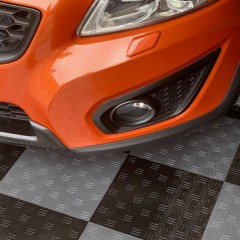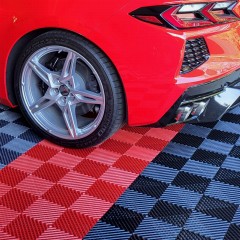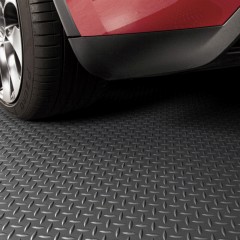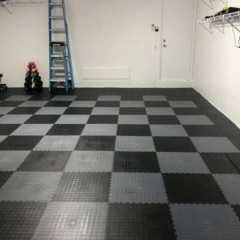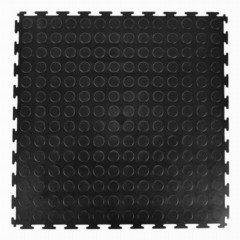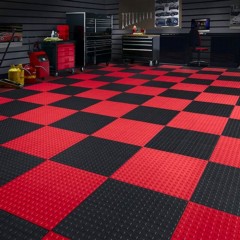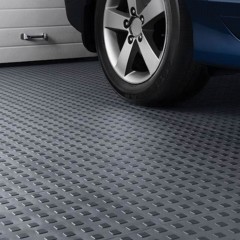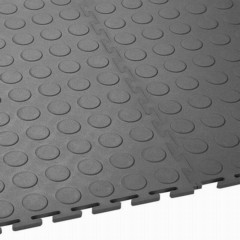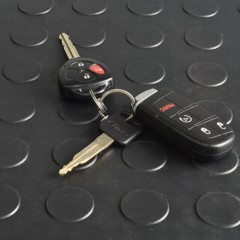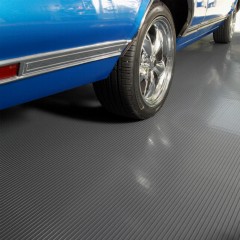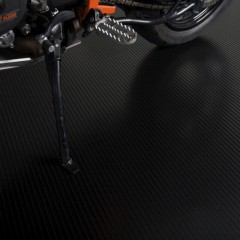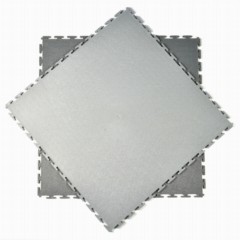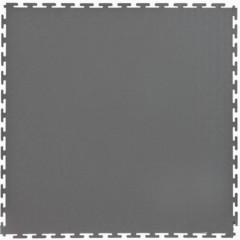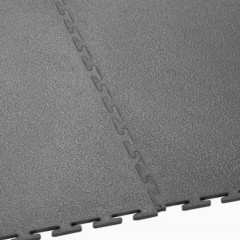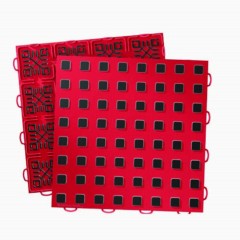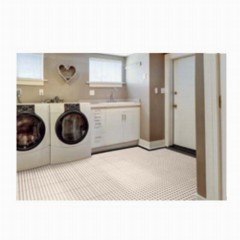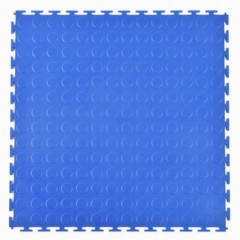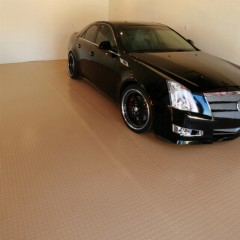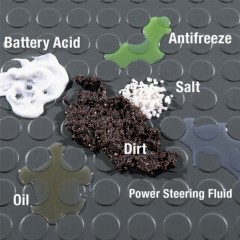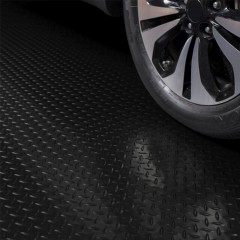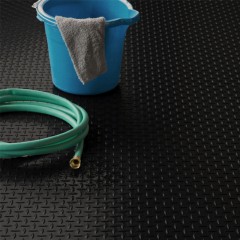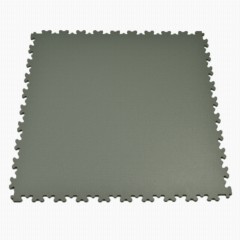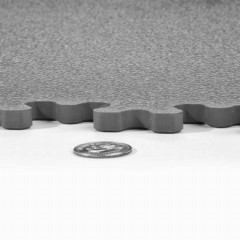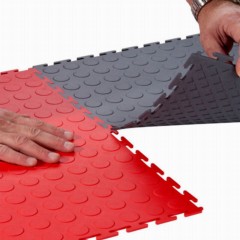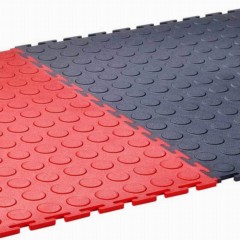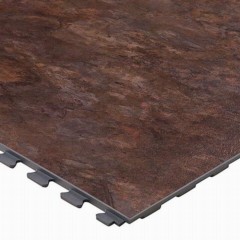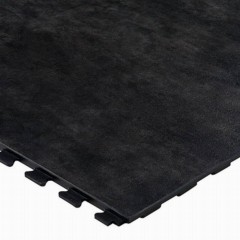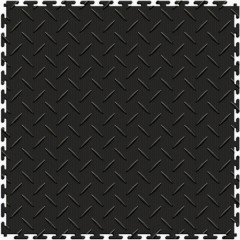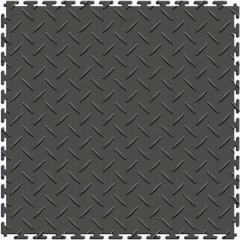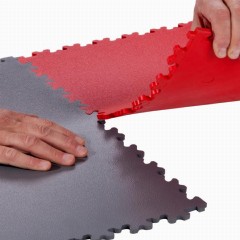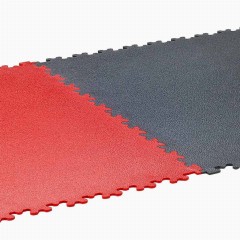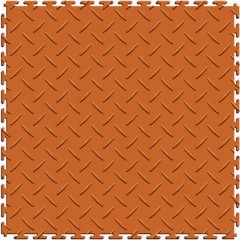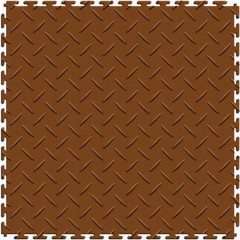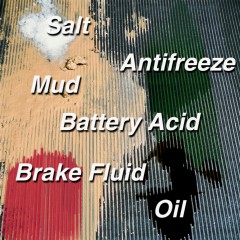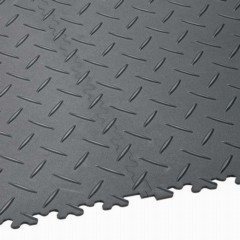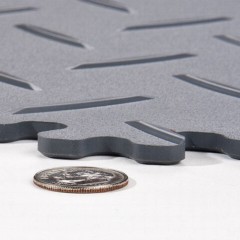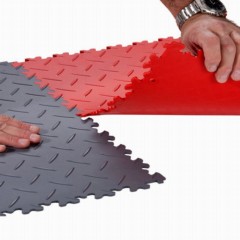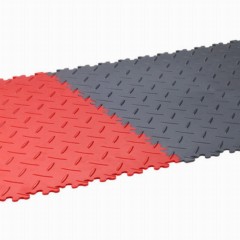Garage Flooring Options
Garage flooring from Greatmats is available in multiple designs and fits several potential installation types. Such versatility makes these floors extremely popular.
We offer garage floor tiles available in several types of materials and sizes. Additionally, we provide vinyl garage flooring rolls, and our multiple floor covering options make a DIY installation possible, saving you money.
Material & Style Options
We offer garage flooring materials that support the weight of vehicles, making them useful in a residential or commercial garage.
The primary materials available for our garage floor coverings include:
- Polypropylene Plastic in Garage Tiles
- PVC Plastic in Garage Tiles
- Vinyl in Garage Flooring Rolls
Rubber/Foam/Carpet: We also have other material options that can be used in a garage, but you should not use rubber garage floor mats, foam tiles, or carpet tiles if you plan to park cars in the space. Carpet, foam, or rubber mats for a garage can support a garage gym, man cave, or workplace area instead.
Multiple Sizes and Designs
We offer
raised tiles or flat tiles, and vinyl rolls that are potentially suitable for parking cars on top of them, although rubber flooring is not suitable.
The raised tiles allow air to flow underneath them, evaporating moisture that's present in the area. Size options for tiles and rolls include:
We also have
custom cut lengths for rubber rolls, should you need a particular size of covering.
Versatile Location
Our garage floor mats are available for either residential or commercial locations.
Residential users can place them over a concrete floor that's showing its age or to yield a space that's ideal as a gathering space or gym in the garage.
Commercial users can create a non-slip surface in a garage that keeps employees safe around cars, especially those vehicles that may have rain or snow dripping off them. Some of our garage tiles can withstand over 20,000 pounds of static load per square foot.
DIY Installation
Our interlocking garage flooring tiles have designs that are ideal for you to do the installation yourself. They often use interlocking edges that fit tightly together without needing glue.
Many of our designs work for repeated assemblies and disassemblies, so you can pick up the tiles and return to the subfloor whenever needed.
The vinyl garage flooring rolls are the easiest to install as you just roll them out. If you want to use more than one roll or prefer to use adhesives, refer to these
G-Floor installation instructions.
Garage Flooring Q&A
What is the best way to cover a garage floor?
With concrete, dampness can become trapped, which may cause early deterioration of the concrete, meaning eventual repair and replacement will be needed. This can be a significant expense. By
covering the garage floor with a raised base tile, air will flow underneath, drying the cement without having to remove anything, which is convenient. This is a great alternative to a more expensive epoxy coating on floors.
Can you use rubber flooring in a garage?
Using rubber mats in a garage is possible if you are transforming the space for a workplace, for a man cave, or for a gym. Rubber garage flooring can support having vehicles driven on it. However, anything that leaks out from your car, such as oil or fluid, could potentially damage the rubber.
What are garage floor mats?
Garage floor mats are an intelligent choice to use in a garage where customers will be storing or working on the car. These mats will provide protection for the subfloor in the garage, which is likely concrete. Should oil, gas, and other chemicals spill onto the floor, the mat will be easier to clean than the subfloor consisting of porous concrete.
Are plastic interlocking pvc garage floor tiles easy to install?
The designs we carry at Greatmats make it easy to
install plastic garage floor tiles on your own, saving you money versus having to hire a professional. We have designs that contain a hidden interlocking tab and loop system or a connecting puzzle edge. Even people who have no experience with flooring installation can do the work successfully.
What are the pros and cons of vented garage floor tiles?
Vented garage flooring tiles offer several benefits, including easy water drainage, improved airflow to resist mildew, excellent slip resistance, the ability to support vehicle weight, and compatibility with in-floor heating systems. Additionally, they come in multiple color options for unique designs.
However, perforated tiles have some disadvantages, such as debris and items falling through the perforations, which require disassembling the tiles to retrieve them.

1 reviews •2 Colors
$7571 /Carton You Save 20%$3.64/sqftShop$15451 /Carton You Save 20%$5.56/sqftShop$3192 /Carton You Save 19%$3.19/sqftShips Out in 4-6 Working DaysShop$9117 /Carton You Save 19%$4.38/sqftShop$31393 /Roll You Save 20%$2.43/sqftShips Out in 1-3 Working DaysShop$18295 /Roll You Save 20%$1.72/sqftShips Out in 1-3 Working DaysShop$16949 /Carton You Save 19%$6.28/sqftShop$18504 /Carton You Save 20%$6.66/sqftShop$10692 /Carton You Save 20%$9.50/sqftShop$7571 /Carton You Save 20%$3.64/sqftShop$20333 /Carton You Save 19%$7.53/sqftShop$1726 /Tile You Save 19%$7.95/sqftShips Out in 1-3 Working DaysShop$9117 /Carton You Save 19%$3.96/sqftShop$38507 /Roll You Save 20%$2.04/sqftShips Out in 1-3 Working DaysShop$12217 /Carton You Save 19%$3.77/sqftShop$14653 /Carton You Save 20%$4.52/sqftShop